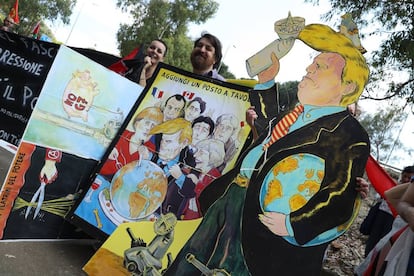How to Dismantle a Superpower
The New World Order will be defined by those who fill the power gaps left by the United States

One of the great surprises that historians will be studying for many years to come is the decision of the United States to give up its world leadership. Moreover, they will have to explain why it did it unilaterally and without anyone taking away the immense power it had accumulated during the last century.
This abdication was not due to a specific decision, but rather the result of a long and complex process. And while the arrival of Donald Trump to the White House accelerated things, the surrendering of power had already been occurring for some time.
While the arrival of Trump accelerated things, the surrendering of power had already been occurring
The internal political fragmentation of the United States and its difficulty in making fundamental decisions have much to do with the decline of its influence. In 2015, Larry Summers, former Secretary of the Treasury, warned that ideological rigidity and the resulting inability to forge consensus, was weakening the country's role in the world. According to Summers: “As long as one of our major parties is opposed to essentially all trade agreements and the other is resistant to funding international organizations, the United States will not be in a position to shape the global economic system.” When Summers said this, the example of the damage the United States was inflicting on itself was Congress’s reluctance to pass reforms aimed at strengthening institutions such as the International Monetary Fund (IMF). Organizations like the IMF and the World Bank are an important part of a world order that benefits the US. Therefore, its strength and relevance should be a priority for Washington. Surprisingly, it is not so.
In the case of the IMF, 188 of its 189 member nations approved the reforms. The US did not, and, without its vote the needed reforms could not be implemented. After waiting five years for the US Congress to act, the Chinese government decided to create a new international financial agency in which Washington would have no influence. Thus, there is now the Asian Infrastructure Investment Bank (AIIB), of which 57 countries are members and another 25 nations, including Canada and Ireland, are about to join. From the beginning the US was invited to join the AIIB, but has yet to do so.
Another recent example of the unilateral transfer of power was Donald Trump's decision to remove the US from the Trans-Pacific Partnership trade agreement, the so-called TPP. The TPP does not include China and Barack Obama’s purpose in proposing it was to create a permanent body to promote US integration with its allies in Asia. Of course, such an agreement also aimed at counterbalancing China's growing influence in the region.
Another recent example of the unilateral transfer of power was Donald Trump’s decision to remove the US from the TPP
One of Trump's first decisions as president was to withdraw the US from the TPP. China reacted immediately and decisively to take advantage of this unusual gift. Beijing initiated high-level negotiations with the 11 other TPP member countries offering them attractive trade agreements. The United States was not invited.
But for Xi Jinping, the Chinese president, these new trade agreements were not enough and he decided to push forward an initiative he had proposed in 2013: the New Silk Road.
Invoking the legendary network of roads that in ancient times connected China with the rest of Asia and reached the Mediterranean, President Xi summoned 64 countries to join a huge road, railway, port, and airport construction project that would unite China with Asia, the Middle East, Africa, Europe, and even Latin American countries such as Argentina and Chile. Sixty percent of humanity lives in these 64 countries and China, and together they represent a third of the global economy. Recently, 44 heads of state attended a meeting in Beijing and signed a communique stating that they “Oppose all forms of protectionism… and endeavor to promote a universal, rules-based, open, non-discriminatory and equitable multilateral trading system.” This of course contrasts with the protectionist attitude of the current US Government.
International trade is not the only area where Washington is losing power and influence
International trade is not the only area where Washington is losing power and influence. The fight against global warming and nuclear proliferation, international aid and control of global pandemics, intervention to contain financial crises, regulation of the internet, management of human activity in the oceans, air, space, the Arctic and Antarctica are just some of the areas in which US importance has waned.
Who will fill these power gaps? The answer to this question will define the new world order. In next week’s column I will offer some answers. I will give you a hint: it will not be China.
Follow me on Twitter @moisesnaim
Tu suscripción se está usando en otro dispositivo
¿Quieres añadir otro usuario a tu suscripción?
Si continúas leyendo en este dispositivo, no se podrá leer en el otro.
FlechaTu suscripción se está usando en otro dispositivo y solo puedes acceder a EL PAÍS desde un dispositivo a la vez.
Si quieres compartir tu cuenta, cambia tu suscripción a la modalidad Premium, así podrás añadir otro usuario. Cada uno accederá con su propia cuenta de email, lo que os permitirá personalizar vuestra experiencia en EL PAÍS.
¿Tienes una suscripción de empresa? Accede aquí para contratar más cuentas.
En el caso de no saber quién está usando tu cuenta, te recomendamos cambiar tu contraseña aquí.
Si decides continuar compartiendo tu cuenta, este mensaje se mostrará en tu dispositivo y en el de la otra persona que está usando tu cuenta de forma indefinida, afectando a tu experiencia de lectura. Puedes consultar aquí los términos y condiciones de la suscripción digital.









































